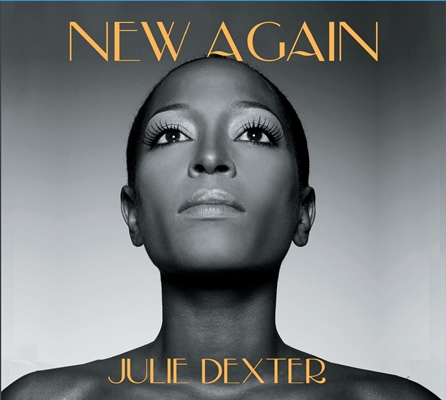Julie Dexter | New Again
Julie Dexter | New Again
by Brent Faulkner
Julie Dexter, a British independent soul/jazz artist, recently released her fourth LP, 2011’s New Again. As a vocalist, Julie Dexter is a ‘smooth operator,’ borrowing some cues from the past, namely from jazz vocalists and R&B vocalists; Sade’s cool sound comes to mind when making comparisons and descriptions of Dexter’s approach. Throughout, Julie Dexter’s voice is smooth, pure, and refined, never losing any of it’s sugary, sensual goodness. The downside is just that on this album – the lack of vigor and overt histrionics (aka unfurling runs) makes New Again a bit too calm, collected, and sometimes sleepy at times. Sure Dexter’s soulful endeavors are always appreciated, the listener yearns for Dexter to break more of a sweat. The other rub might be the song length, which too often crosses the four minute mark and beyond. Despite the flaws, New Again possesses enough solid material to allure.
“Sunrise” is arguably the album’s best cut, opening with solid production work, most notably an infectious, soulful groove established from the onset. The harmonic progression is a highlight here as well, namely on the memorable chorus, which finds supporting, harmonized background vocals singing: “I pray you live each day of your life/it’s the only way you can survive/if you keep your head to the sky…you’ll see sunrise.” Well-penned and enjoyable, “Sunrise” is a winner. It’s follow-up, “Blue Skies,” isn’t too shabby itself. Here, the groove is more laid-back, and the ‘chill’ vibe continues to dominate. The highlights of “Blue Skies” include the crossover R&B/jazz appeal, as well as a memorable refrain which features alternation between Dexter’s lead vocals and background vocals. The cons would be length and perhaps a bit too many instrumental breaks – too much ‘empty’, static space. “What Goes Around” follows, keeping the momentum of New Again still lofty at this point. A bit of predictability begins to creep in with the continued trend of instrumental breaks, but Dexter’s lovely vocals and another well-penned refrain atone for any misstep (“What goes around, comes around/What comes around/goes around…).
“Love 2 Love” is strong, featuring a brilliant harmonic scheme with ‘jazz’ written all over it. Here, Dexter belts a bit more than she has throughout the effort, which is a highlight. “Come On Home” is similarly solid, and a bonus might be it has the distinction of being the only cut on the effort that clocks in under four minutes. The production is sound, featuring horns and a soulful, fat bass line. The opening harmonized background vocals set a soulful tone that is maintained throughout the cut. Dexter sounds superb here, making New Again an incredibly sound effort up until this point. By the title track “New Again,” there is a slight ‘decline,’ but the title track is still solid for the most part. The main rub is that the soulful outtro grows a little overindulgent, prolonging the length of the cut. Dexter’s ad libs are nice, though one is still waiting for that break out, soul-stirring ‘leap’ to the next level – the next dimension.
“This Thing Called Love” is off-putting at first, delving into a latin-jazz R&B style. The cut eventually unfurls to its full fruition, but does so solidly, not ‘exceptionally’ per say; a high point is Dexter’s scatting. “Broke Up About You” begins all too abruptly, making the track sound overly ponderous and ambiguous. Eventually, the cut settles in once the listener has adjusted to the swirling electric piano, but the track lacks some drive while its muse could dig deeper and establish more grit about the performance. “I Can Make You Dance” is a mixed blessing. On the one hand, it smartly restores some momentum and excitement about the cut. On the other hand, it is too long and could even be a more driving, cutting-edge cut than it is. All-in-all, “I Can Make You Dance” is still enjoyable without being revolutionary.
“Melanin (Beautiful People)” and “Who I Am” are both second-rate when compared to the first five or so cuts, but find their muse in top-notch vocal form. Closing cut, “I Can Make You Dance (Murani Mix)” suffers from overwrought length (a staggering juggernaut at over eight minutes), but may be more clever than the original track. Despite its consummate length, it does feature some exceptional sounds about it.
New Again, then, turns out to be an album with both solid moments as well as some flawed ones. Dexter’s jazzy, cool delivery is always nice, but the listener yearns for more of a ‘breakout‘ – she achieves this moderately on “Love 2 Love.” Producer Steve Maestro’s productions are equally nice, but sometimes stagger on for too long and could stand just that extra ‘something’ to tighten up the cut even more. Flaws aside, Julie Dexter is certainly a talent voice for neo-soul, adult contemporary R&B, and smooth jazz. Her crossover appeal helps to make New Again a successful effort for the most part and a welcome addition to 2011’s soul collection.
Brent Faulkner
The Urban Music Scene
